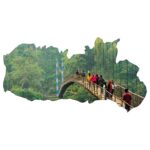National People’s Party (NPP): 7 Key Insights Into Its Impact, Significance, and Legacy
Introduction
The National People Party (NPP), a relatively young political party in India, has made a significant impact on the political landscape, particularly in the Northeastern states. Founded in 2013 by P.A. Sangma, the NPP has quickly become a prominent player in regional politics, advocating for the empowerment of indigenous communities and inclusive development. Despite being a relatively small party, it has carved a unique niche in the nation’s political system, often forming alliances with other regional and national parties to address the region’s specific challenges. This article explores the history, impacts, facts, and significance of the NPP and its ongoing relevance to society.
History of the National People Party
The National People Party was officially established in 2013 by Purno Agitok Sangma, a seasoned politician who had served as the Speaker of the Lok Sabha and was also a former Chief Minister of Meghalaya. The party was founded with the intent to provide a platform for the people of the Northeast and to represent their interests on a national level. Sangma, who had been a member of both the Indian National Congress and the Trinamool Congress before establishing the NPP, envisioned a party that would bridge the gap between regional aspirations and national governance.
The NPP was initially formed in the backdrop of political dissatisfaction with existing regional and national parties. It sought to address issues such as ethnic identity, autonomy, economic underdevelopment, and cultural preservation in the Northeastern region. With its core ideology rooted in regionalism and federalism, the NPP quickly garnered attention in states like Meghalaya, Nagaland, and Manipur.
Daily Life Impacts of National People Party
The influence of the NPP is particularly felt in the daily lives of the people living in the Northeastern states. The party focuses on empowering local communities and ensuring that their needs are addressed within the larger national framework. This is especially significant in a region that has historically been marginalized and has faced issues like ethnic tensions, economic disparity, and political alienation.
The party advocates for the preservation of tribal cultures and the empowerment of women, while also pushing for better education and healthcare. Many people in the region have reported that the party’s efforts toward regional autonomy have led to a sense of pride and ownership over their local governance. The NPP has made strides in improving infrastructure, supporting local industries, and promoting sustainable practices in areas like agriculture and tourism.
Additionally, youth empowerment has been a key agenda for the NPP, with initiatives designed to provide job opportunities, better education, and platforms for young people to become politically active and socially engaged.
Key Facts About the National People’s Party
- Founding: The NPP was founded in 2013 by P.A. Sangma.
- Political Alliances: The NPP has formed strategic alliances with various parties such as the BJP and the Congress, depending on the political landscape in different states.
- Primary Focus: The NPP focuses on regional issues, especially those that impact indigenous communities in the Northeast, including autonomy, economic growth, and cultural preservation.
- Electoral Success: The NPP has won significant seats in the Meghalaya Legislative Assembly and has been part of the ruling coalition in the state.
- Core Ideology: The party advocates for federalism, regional empowerment, and inclusive governance.
- Leadership: After the demise of P.A. Sangma, the leadership of the party was passed on to his son Conrad Sangma, who later became the Chief Minister of Meghalaya.
- Presence: While the NPP has made its mark in the Northeast, it has started to expand its footprint in other parts of the country as well, though it remains primarily focused on the Northeast.
Significance of National People Party in Indian Politics
The National People’s Party is a significant political entity in India because it offers a platform for the marginalized and indigenous communities of the Northeastern states. It is one of the few parties that consistently advocate for the rights and aspirations of these communities at the national level, making it crucial for addressing regional disparities in India.
The NPP also plays an important role in the coalition politics of the Northeast, often acting as a kingmaker in states like Meghalaya. Its ideological stance on federalism allows it to form alliances with various parties that share its commitment to strengthening state autonomy. This has earned the NPP respect as a party that can navigate the complex political landscape of India.
Additionally, the NPP’s emphasis on cultural preservation is significant in a country where diverse ethnic and tribal groups often face the threat of cultural dilution. The NPP has worked to ensure that the cultures and languages of the Northeastern tribes are not only preserved but celebrated within the larger national context.
Observance and Importance in Society
One of the key observances in the life of the National People’s Party is its commitment to local governance. It encourages grassroots political participation, ensuring that the voices of ordinary people are heard. The party’s approach is more inclusive than top-down, empowering local leaders to take charge of their communities and making them accountable to the people.
The NPP also observes cultural practices and regional festivals to connect with the people on a deeper level. By participating in local events, the NPP demonstrates its genuine interest in the day-to-day lives of its constituents, further cementing its relationship with the local population.
Wishing and Well-Being in the National People Party (NPP) Vision
The NPP envisions a future of prosperity and peace for the people of the Northeast. It strives for a unified and inclusive India, where the diverse cultures, languages, and identities of the Northeastern states are respected and preserved. Its leaders regularly convey messages of hope, wishing for a future where every citizen can thrive in a secure and empowered environment.
The party’s leadership also emphasizes social justice, working toward a future where equality and opportunity are available for all, irrespective of background or ethnicity. This vision of a more just and fair society resonates strongly with the people of the region, who have long felt alienated from the mainstream political discourse.
FAQs About the National People Party
- When was the NPP founded? The National People Party was founded in 2013 by P.A. Sangma.
- Who is the current leader of the NPP? The current leader is Conrad Sangma, the Chief Minister of Meghalaya.
- What is the NPP’s core ideology? The NPP advocates for federalism, regional empowerment, and inclusive governance.
- Where does the NPP have a significant presence? The NPP has a significant presence in Meghalaya, Nagaland, and Manipur.
- What is the NPP’s stance on tribal issues? The NPP focuses on tribal empowerment, the preservation of indigenous cultures, and economic development in the Northeast.
Conclusion
The National People Party (NPP), while a relatively new entity in the Indian political scene, has already made a remarkable impact. Through its commitment to the empowerment of indigenous communities, regional autonomy, and inclusive growth, the NPP plays a vital role in shaping the future of India’s Northeastern states. Its approach to coalition politics, cultural preservation, and grassroots leadership has earned it respect and recognition, and it continues to be a powerful force in India’s diverse political ecosystem.











I had https://www.readingma.gov/?q=ahrefhttps://cookssimplepainting.com/ great experience with Cook’s Simple Painting last month. They showed up on time, finished ahead of schedule, and left the place spotless. If you’re looking for house painters that don’t cut corners, check them out.